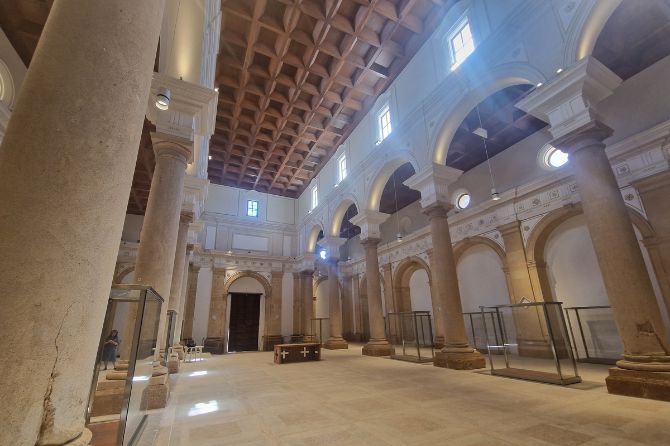Rehabilitation in prisons at the center of research at Liceo Carducci in Rome
Five years after their involvement in the A Scuola di OpenCoesione (ASOC) project, Paola and Lorenzo, project managers for the team Muoviamoci Uniti Ricercando Oltre (MURO), still get emotional talking about that experience of civic monitoring. They say that ASOC changed their lives.
 It all started with the idea to monitor the project Centro Orientamento Lavoro (COL) Carceri in Rome, a job placement programme for former prisoners, with the clear goal of helping to reduce prejudice concerning former prisoners and increasing awareness of the importance of rehabilitation.
It all started with the idea to monitor the project Centro Orientamento Lavoro (COL) Carceri in Rome, a job placement programme for former prisoners, with the clear goal of helping to reduce prejudice concerning former prisoners and increasing awareness of the importance of rehabilitation.
So it was that the students on team MURO, coordinated by the educator Barbara Festuccia, conducted an in-depth study that went beyond the specifics of the project to be monitored to also look at the broader landscape of prisoner rehabilitation in Italy.
Lorenzo Cevinini, who went on to earn an undergraduate degree in International Relations and is working towards a master’s degree in Political Science, explained, “Those who go through job training while in prison and have the possibility to continue once on the outside have only a one percent rate of recidivism.
It was in part from this important statistic that we decided to choose this topic for our research, which then guided my choice of university studies, as it was because of ASOC that I understood the importance of active citizenship in the context of public policy, especially with regard to those policies that have to do with such an important aspect of our constitutional and democratic law and order as prisoner rehabilitation.”
The team’s civic monitoring work, supported by the “Friends of ASOC” association for gender equality Rising, involved not only the collection and analysis of data found online on the websites of Italy’s Justice Ministry and Department of Corrections, but also interviews of representatives of COL Carceri and industry experts like the agency ensuring the rights of prisoners in the regions of Lazio and Umbria, instructors at the prison schools, and representatives of non-profit organisations.
 In their report published on Monithon, the students rate the project as “potentially effective but with issues” (i.e. on the whole useful but with weaknesses or risks that could compromise its efficacy, not related to delays or problems in implementation). As the report states, COL Carceri includes an office that provides an effective service of employment assistance and contributes to combating prejudice towards inmates and immigrants. However, in the opinion of the students, this service could target a broader audience in terms of both specific consulting services and the promotion of greater public awareness of the issue, including by organising specific conferences and other events.
In their report published on Monithon, the students rate the project as “potentially effective but with issues” (i.e. on the whole useful but with weaknesses or risks that could compromise its efficacy, not related to delays or problems in implementation). As the report states, COL Carceri includes an office that provides an effective service of employment assistance and contributes to combating prejudice towards inmates and immigrants. However, in the opinion of the students, this service could target a broader audience in terms of both specific consulting services and the promotion of greater public awareness of the issue, including by organising specific conferences and other events.
In addition, job placement assistance for former inmates, and in particular for immigrants – which account for more than 40% of the prison population in the Lazio region – “could be more effective”. In their concluding remark, the team notes that a large part of the inmates have no specialist skills and work inside the prison solely as maintenance or gardening staff. Few are given the opportunity to work both inside and outside the prison walls, given that few receive any training, with the exception of inmates who work for the social coops, such as Caffè Galeotto or Fine Pane Mai in Rebibbia.
The team’s recommendations to make the COL Carceri project more effective are summarised well in a video, and specifically: to more widely disseminate information on employment services and related calls for tender; to increase the presence of specialists in other COL Carceri centres around Rome; and to organise conferences for the public to promote awareness of the issues.
In line with their recommendations, the Carducci students worked hard to take part in initiatives to increase awareness of the issue, including appearing in the documentary Rebibbia 24 and organising various public events, such as Carceri senza sbarre (Prisons without bars), an event held on 7 February 2018 that attracted a great many participants for an in-depth discussion of the validity of alternative measures to prevent recidivism.
 Barbara Festuccia, the Philosophy and Human Sciences teacher who coordinated the students’ work, remarked in relation to this important issue, “With the data gathered during their monitoring research, the students learned to see things through a different lens.
Barbara Festuccia, the Philosophy and Human Sciences teacher who coordinated the students’ work, remarked in relation to this important issue, “With the data gathered during their monitoring research, the students learned to see things through a different lens.
For example, learning that the rate of recidivism, meaning the number of former inmates who return to a life of crime after their release, is markedly lower among inmates who are assisted by social services underscored for us the increasingly pressing need to promote rehabilitation and education in prisons.”
Paola Parente (22), now in her fourth year in Primary Education Sciences at Rome’s La Sapienza University, recalled, “The ASOC work focused on the issue of rehabilitation helped me to understand how important it is to focus my future aspirations on education. This is why I chose to study to become an educator, because I’m convinced that education is essential not only to individual growth, but also to give greater hope to anyone experiencing difficulties.”
It was only natural, then, that the results of the MURO team’s efforts were presented again, one year after completing the ASOC educational programme, at the culture and literature event Libri Come held at Rome’s Parco della Musica Auditorium on 16 March 2019. The message the students conveyed at the event was as simple as it was impactful: “Rehabilitation sets you free!”
“To this day, when university professors ask us to introduce ourselves and explain why we chose to study primary education, I talk about the programme of active citizenship at ASOC because it changed my life and how I see the world and my future in it,” Paola added.




